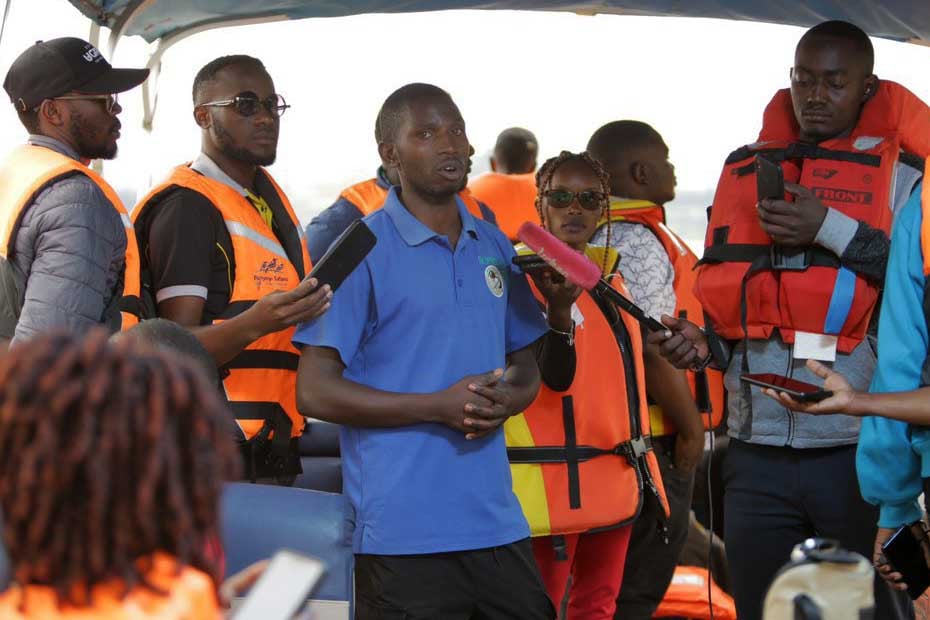Prime
Media tipped on how to unlock fortunes in the tourism sector

Travel journalists interviewing a resident on Lake Bunyonyi during their field excursions. PHOTOS/COURTESY
What you need to know:
- Sustainable tourism takes full account of the current and future economic, social and environmental impacts, addressing the needs of visitors, the industry, and host communities.
- People travel to destinations after they have been told.
In a bid to boost tourism and rally the media into positive and responsible reporting about the sector, the Uganda Tourism Board and the Ministry of Tourism, Wildlife, and Antiquities, have held robust engagements with members of the media, since March.
Authorities in the tourism sector believe that the media is key in highlighting natural endowments and making known the unknown, which markets destination Uganda.
During a knowledge sharing workshop focusing on the role of media in covering tourism held in Kabale District recently, it was noted that journalists, through their story packaging, narration of impactful stories, explanatory reporting, and carrying out investigative work, can tremendously improve the tourism sector.
Tourism products such as gorilla tracking, nature-guided walks, village walks, bird watching, and rare fauna and flora species, according to the Ministry of Tourism.
Journalists help people broaden their knowledge of where they should go and what to see there.
The tourism sector is dependent on media reporting, as they highlight the natural beauty of Uganda, using their platforms.
Media informs, creates curiosity and influences people to explore some areas and this is how tour decisions are made by people who have never been to the destinations. People travel to destinations after they have been told.
Thembo Johnson Kakinire is a travel journalist. He says journalists have the task of marketing destinations.
“It is very fortunate that a big percentage of Ugandans do not know the number of national parks we have in the country. We need to promote tourism to all people, not just foreigners. We are cheating Uganda by not talking reporting on tourism. We should not only talk about the negative side,” he says.
Why the partnership
Simplicious Gessa, the public relations officer at UTB, stresses the need to promote the tourism agenda and market destination Uganda.
“We rely on journalists to spread communication across the country. So, a partnership based on information and knowledge is important in promoting tourist attractions, the tourism products and culture,” he stresses.
Journalists are required to report accurately, critique and push for accountability and transparency and facilitate dialogue, without thwarting the efforts of the tourism sector.
Challenging task
Job Namanya, a travel reporter attached to Vision Group says access to travel destinations, especially getting information, still stands in the way of responsible reporting on tourism.
“Accessibility to these sites is very expensive. Yes, you may have passion to write travel stories and an interest in promoting your country, but when you travel to get some stories, you will not know where to sleep. Facilitating ourselves to cover tourism stories is a challenge,” he explains.
“In the long run, that company that you are protecting will have no business; you will not have that advertisement, and you will also run out of business.
By asking these questions, you are working towards improving the sector, and that is what we should all work for.
Institutions should also know that these stories are not meant to destroy them or paint a bad picture about them, but you are doing your role of enabling the sector,” says Dr John Baptist Imokora, a media trainer and veteran journalist.
Negative reporting
Tourism enthusiasts says when journalists report irresponsibly or focus on negative stories, the tourism sector suffers greatly.
Eunice Tworekirwe, the principal public relations officer, in the Ministry of Tourism, says during the Ebola outbreak in 2022, Uganda made significant losses in the tourism sector, due to hurried media reports.
“After the Ebola outbreak story, a huge number of tourists who had booked with us cancelled their trips. That is a great loss to the sector. If the person who first broke the Ebola story had considered the impact, we would not have lost visitors,” she argues.
Sustainable tourism
Gessa argues that the media have a significant role in influencing stakeholders to adopt a sustainable tourism agenda.
Sustainable tourism is defined by the United Nations Environment Program and the United Nations World Tourism Organization as “tourism that takes full account of its current and future economic, social, and environmental impacts, addressing the needs of visitors, the industry, the environment, and host communities.”
“How can we benefit from the sector but also ensure that whatever is attracting tourists remains sustainable and is available, and our children, grandchildren, and future generations can also benefit?” he wonders.
Sustainable tourism means physical integrity, biological diversity, resource efficiency, environmental purity, visitor fulfillment, local control, community wellbeing, and cultural richness, among others.
According to Imokora, it is not enough to look at the number of tourists the country gets, but it is important that journalists ask questions about whether the country is going to get the same number of tourists that it is getting now in 20 years to come.
“There is a need to communicate the sustainable practices adopted by tourism operators, such as eco-friendly accommodation, renewable energy use, waste reduction, and water conservation efforts,” he says.
He adds that when reporting about tourism, journalists need to highlight certifications or partnerships with recognised conservation organisations to establish credibility and demonstrate their commitment to responsible tourism.
What are the bottlenecks?
Imokora further explains that whereas journalists are required to report responsibly on the tourism sector, there are other bottlenecks in the sector that also need to be addressed.
“The budget for the tourism sector needs to be sorted out; people who are corrupt in the tourism system need to be brought to book; people fleecing tourists need to be dealt with. The luggages of tourists getting lost needs to be addressed. What about our lakes, rivers, and cultures? We can still say something positive about what we have and what we can promote,” he adds.
Martin Mugarra Bahinduka, the State Minister of Tourism, says promoting Uganda is a responsibility of all Ugandans.
“The responsibility of promoting Uganda is for all of us. There is a lot that this country can offer. According to what the sector contributes, more than 1.5 million people are employed in the sector,” he says.
Salient
Media informs, creates curiosity and influences people to explore some areas and this is how tour decisions are made by people who have never been to the destinations.
People travel to destinations after they have been told.





